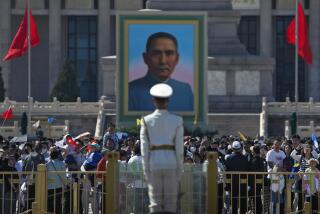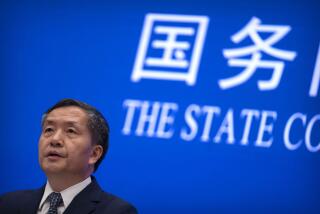China’s Action Pleases IOC
- Share via
Mindful of China’s promises of openness and accountability in connection with the Beijing Summer Olympics in 2008, a key International Olympic Committee official on Monday called the move by Chinese officials to acknowledge hundreds more cases of SARS while stripping two top officials of their power a “very responsible reaction.”
Hein Verbruggen of the Netherlands, who heads the IOC’s Beijing 2008 oversight committee, said in a telephone interview, “You can always argue it could have happened earlier. I can understand the country is reluctant. But that is not only China. Many countries might say, ‘We are a little bit reluctant to say immediately that the problem is serious.’
“On the other hand, they seem to now understand the magnitude of the problem.”
On Sunday, the Chinese government, which had been embroiled in a growing furor amid allegations of a state-sanctioned cover-up, fired its top public health official, Zhang Wenkang, and the mayor of Beijing, Meng Xuenong, while admitting to the existence of more than 200 previously undisclosed SARS patients in military hospitals. Both men were also stripped of their Communist Party posts, the source of real power in China.
Gao Qiang, vice minister of health, said at a nationally televised news conference that as of last Friday, Beijing had 339 confirmed cases of SARS, with 18 deaths and an additional 402 suspected cases -- up from 37 cases and four fatalities reported earlier in the week. The new numbers bring the total of confirmed cases on mainland China to 1,807, highest in the world, and 79 deaths.
Worldwide, the SARS epidemic has killed more than 200 people and infected about 3,800. SARS, or severe acute respiratory syndrome, is believed to have originated in the southern Chinese province of Guangdong.
Zhang and Meng were fired as experts in Chinese government, politics and in sports watched closely the first domestic crisis to confront President Hu Jintao since he took office last month.
The World Health Organization had disputed assertions that China was safe for business and for travel, and the media, domestic and foreign, had assailed the government’s secretive handling of the epidemic.
In 2001, while bidding for the 2008 Games, Chinese officials repeatedly underscored their intent to stage Games marked by accountability and by governmental and bureaucratic transparency.
Referring to Sunday’s dismissals of the mayor and the health minister, Verbruggen, who more than five years away from the 2008 Games is already in “almost daily” contact with authorities in Beijing, said, “I cannot judge the political decisions they take. This is not up to the IOC to argue about that. We don’t have an opinion about that.” He also said, “You can argue about whether it is too late. But the fact that there are political consequences is a very, very good sign.”
Susan Brownell, a professor and China expert at the University of Missouri St. Louis, said, “The fact that the Communist Party is holding its own responsible is incredible, because in the past the party has not properly punished its own members by the same standards a non-party member would be punished by.”
UC Berkeley China scholar Orville Schell observed, “What you’re seeing is a kind of the yin and yang of the old China, sort of the retro China, and the new kind of global China -- working as sort of oscillating pulses.
“First you try to hide it. Then you sort of go public with a vengeance, pin the blame on a few malefactors and welcome the World Health Organization.”
He added: “One could imagine that if the Olympics come a cropper somehow ... they are perfectly capable of having a similar contradictory reaction.
“It’s a fascinating contradiction in a state of dynamic tension. Everywhere you look in China, you see this contradiction at work.
“And indeed, I think the only way to understand China is as a contradiction, which,” he said, laughing, “is a very Maoist notion to begin with.”
More to Read
Go beyond the scoreboard
Get the latest on L.A.'s teams in the daily Sports Report newsletter.
You may occasionally receive promotional content from the Los Angeles Times.






